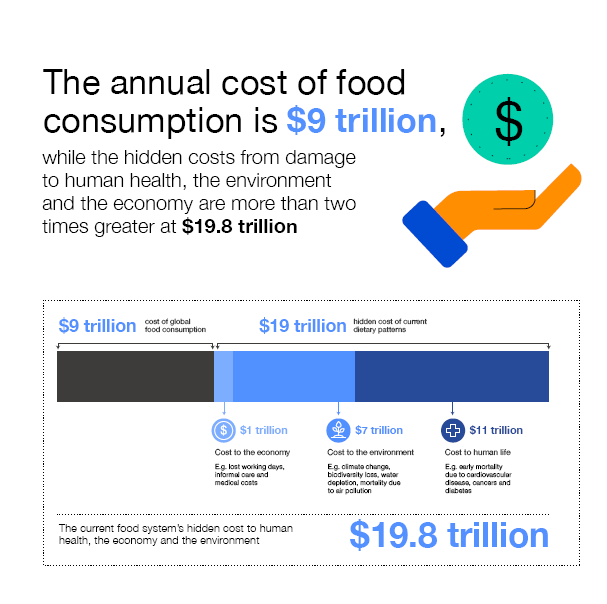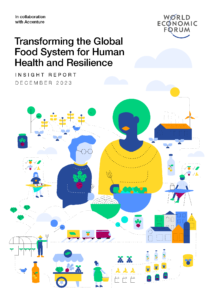Transforming the Global Food System for Human Health and Resilience – an Insight Report from the World Economic Forum
Preface
Post World War II, the global food system focused on producing safe, inexpensive, high-calorie food for the world’s growing population. While extreme hunger has decreased, countries now contend with divergent but related health crises. Worldwide, over 800 million people are experiencing food insecurity, resulting in 9 million deaths per year, as of 2021. At the same time, 1.9 billion are overweight or living with obesity, with diet-related chronic diseases contributing to 11 million deaths per year, as of 2017. Conditions related to excess body weight now kill more people than hunger, and heart disease is the leading cause of death. Obesity rates have nearly tripled since 1980, and the incidences of diet-related non-communicable diseases (NCDs) such as heart disease, high blood pressure, diabetes and cancer have more than doubled in the same time. Poor nutrition is a primary driver. As of 2023, 17 million people die each year due to poor diets, more than double the total deaths since the onset of the COVID-19 pandemic (7 million). What’s more, 78% of COVID-19 hospitalizations and deaths were linked to diet-related NCDs such as obesity, type 2 diabetes and high blood pressure. In addition to the threat to human health, the dominant food system is also threatening the planet. Agriculture contributes 25% to 42% – or about a third – of all global greenhouse gas (GHG) emissions. The expansion of agricultural land drives deforestation, with more than 41 million trees cut down daily.10 Conventional farming practices compromise soil fertility and productivity, resulting in the loss of 12 million hectares of arable land annually. The total externalities linked to poor nutrition, including costs to human life, environmental sustainability and economic loss, are currently nearly $20 trillion, more than double the direct cost of global food consumption.
The global food system no longer meets the world’s health or sustainability needs and must rapidly evolve. Facilitated in collaboration with Accenture, the New Frontiers of Nutrition initiative convenes a diverse set of stakeholders to accelerate progress towards improved global nutrition, sustainable diets and greater human health resiliency.
Read the entire report, Transforming the Global Food System for Human Health and Resilience – an Insight Report from the World Economic Forum, by clicking here or on the image above.


